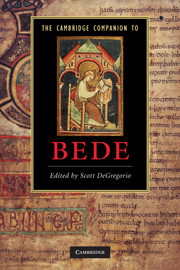Book contents
16 - The Englishness of Bede, from then to now
from Part III - Reception and Influence
Published online by Cambridge University Press: 28 January 2011
Summary
Shakespeare and Chaucer are more famous English authors than Bede, who wrote nothing in the English language that has survived. But his place in English culture is, like theirs, a lasting one, if only because his account of the cowherd Cdmon in the Ecclesiastical History of the English People supplies an iconic narrative for the origins of vernacular poetry (IV. 24). Even though his fame, for many readers, hangs on this slender thread, Bede has long been recognized not only as a great author but also as a distinctively English writer. Bede did not think of himself as English, however, and those who admiringly refer to him as English risk the error of implying either that Bede wrote in English or that his sense of the English people corresponds to theirs. The last two words in the title of Bede's most famous work - Historia ecclesiastica gentis Anglorum - are ambiguous. A gens is a people as opposed to a nation or tribe, but all three ethnic units are notoriously difficult to describe. Anglorum could refer to the continental Angles, a people named by Bede among the foreign settlers of Britain; to those who lived in Northumbria in his own time, or to Mercians; to all those tribes that eventually became the 'English', an inclusive term for Angles, Saxons and several other ethnic groups; or to those who spoke English. Yet, as if these specific meanings did not exist, generations of readers after the Old English period have found their own views mirrored in Bede's and have seen him as English in the same way they see themselves.
- Type
- Chapter
- Information
- The Cambridge Companion to Bede , pp. 229 - 242Publisher: Cambridge University PressPrint publication year: 2010
- 2
- Cited by



